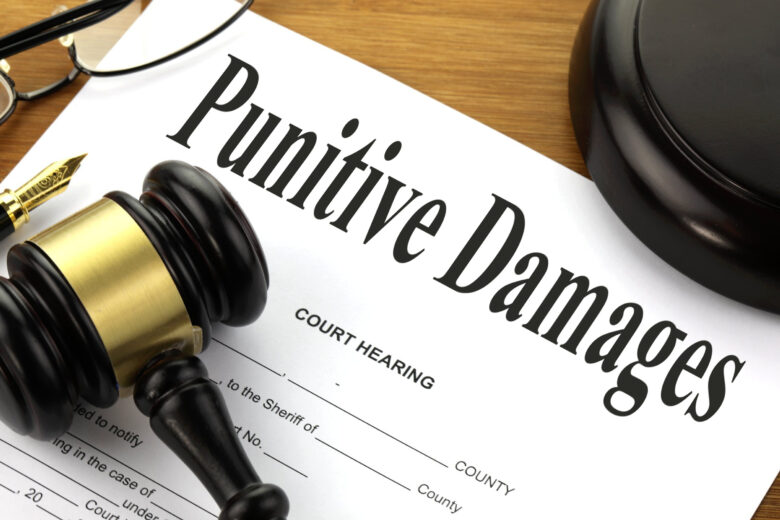The word punitive damages can strike fear in the hearts of employers, business owners, and industrialists from around the world. The term ‘punitive’ comes from the Latin word for ‘punish.’ Just what are punitive damages? Do you have to be guilty of a tort action to receive them? Below we will solve this mystery and set forth guidelines as to what you need to understand about punitive damages.
What are punitive damages?

Punitive damages are intended to punish the wrongdoer. In some states, they are also known as exemplary damages or vindictive damages. In other words, they are meant to punish the defendant and deter others from behaving similarly. Punitive damages are usually awarded in addition to compensatory damages, and they can be significant in size.
In most states, punitive damages are only appropriate when gross negligence or intentional misconduct has been proven. The amount of punitive damages is determined by the judge or jury in a case, who must take into account several factors. These include:
- The nature of the harm caused by the defendant’s actions.
- The severity of the defendant’s wrongdoing.
- The wealth of the defendant; and whether any criminal charges were filed against the defendant in connection with the incident that led to litigation.
Nature of harm caused by defendant’s action
The nature of the harm can play a major role in deciding whether to punish the person with punitive damages or not. For example, if a person drives under the influence, they are intentionally increasing the possibility of accidents. That should not go unpunished. Issuing a punitive damage fine for these kinds of crimes can reduce future mistakes.
The severity of the defendant’s wrongdoing

Not all negligence ends up with a severe outcome. For minor damages, the compensation fine will be enough. However, for negligence that caused an immense amount of damage, punitive damages will be the right option. If an at-fault person’s negligence resulted in the death of a person, the at-fault person should be punished severely with punitive damages.
Wealth and Previous Records
If the defendant has previous records of wrongdoing, they might be forced to pay punitive damages. The first offense can be forgiven. But, continuously committing crimes should not go unpunished. Only severe punishments can prevent them from committing wrongdoings. In addition, the wealth of the person is helpful in determining the fine amount.
When are they awarded?
Punitive damages are awarded only when a plaintiff proves that the defendant’s actions were intentional or reckless, such as when a business knowingly sells products with dangerous defects or fails to fix an unsafe condition that causes injury or death. The plaintiff must also show that the defendant’s actions were extreme and outrageous compared with what is considered reasonable care under similar circumstances.
How much can be awarded in punitive damages?

The compensation for your punitive damages depends on the state in which you live. Some states cap their punitive damage awards at a certain dollar amount, while other states leave them open-ended. In some states, there may be no limit on how much can be awarded. You can learn more from this page and know how much you can get for your punitive damages.
As said, every case is different, and every state has different laws. If you suffer from any damage, it is important to hire a local lawyer. A lawyer from your state can explain to you the laws about punitive damages in your state. Discuss with the lawyers about your case to know the maximum amount you can get as punitive damages.
What kind of conduct justifies punitive damages?
Punitive damages may be awarded when the defendant’s conduct is found to be reprehensible or Punitive damages can be awarded under a number of circumstances. They may be awarded if a person’s conduct was particularly reprehensible or malicious or if the defendant acted with reckless indifference to others’ rights. Punitive damages may also be awarded if there has been an obvious disregard for safety regulations or if someone has been egregiously dishonest in dealing with their customers or employees.
How are punitive damages calculated?

Punitive damages are often calculated as a percentage of the defendant’s net worth or annual income. For example, if a defendant has a net worth of $100 million and he is found guilty of committing fraud against his customers, he might be ordered by the court to pay $10 million in punitive damages — 10 percent of his net worth — to punish him for his misdeeds.
A real-life example of punitive damage
MGA vs. Mattel
Mattel and MGA are both toy companies. Mattel is the creator of the most famous doll, Barbie. Barbie ruled the girls heart for a long time. MGA is the doll company that created Bratz dolls. Now the issue is that MGA sued Mattel for stealing trading secrets from them.
This case went on for several years. In the end, a judge ruled in favor of MGA. MGA was awarded 85 million dollars as punitive damages. Note that this 85 million dollar is punitive damages alone, not the whole settlement.
Your case
If you have been the victim and you need compensation, it’s important to know that punitive damages can be applied in addition to compensatory damages. You should also know that in order for your case to get punitive damages, punitive damages must be applied. To ensure that it is, you will need a source of professional guidance along the way.
It can be hard to understand punitive damages. Hiring a lawyer is the best option when it comes to personal injury lawsuits. A lawyer’s primary focus will be on how to maximize your compensation. They will know whether you can pursue punitive damages.
The next time you suffer a personal injury due to the negligence of someone, be sure to pursue punitive damages too. However, the legal process is not easy. Even MGA had lawyers. It is not wrong for you to hire a lawyer. Hire a lawyer immediately and maximize your compensation.


